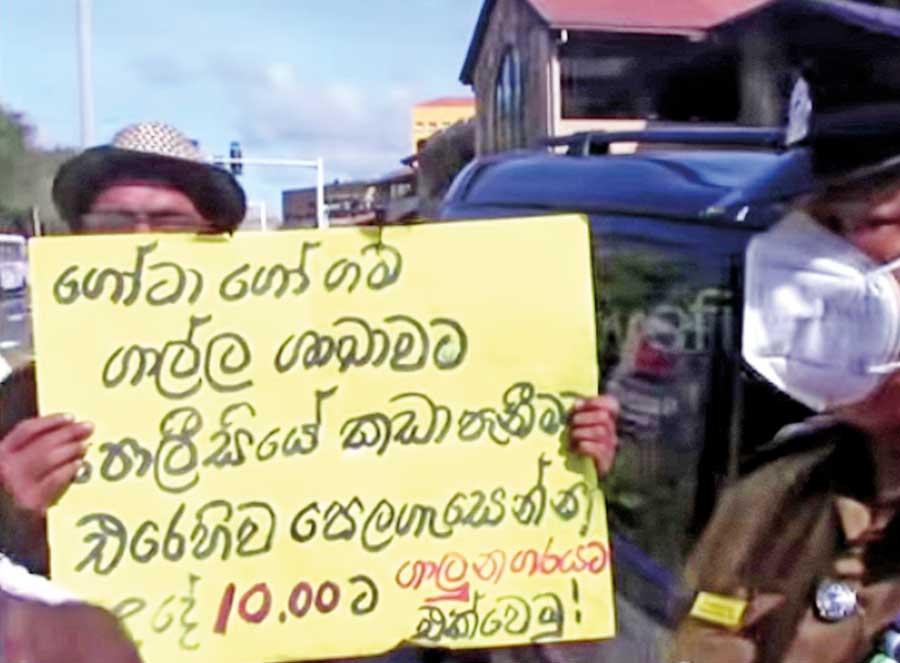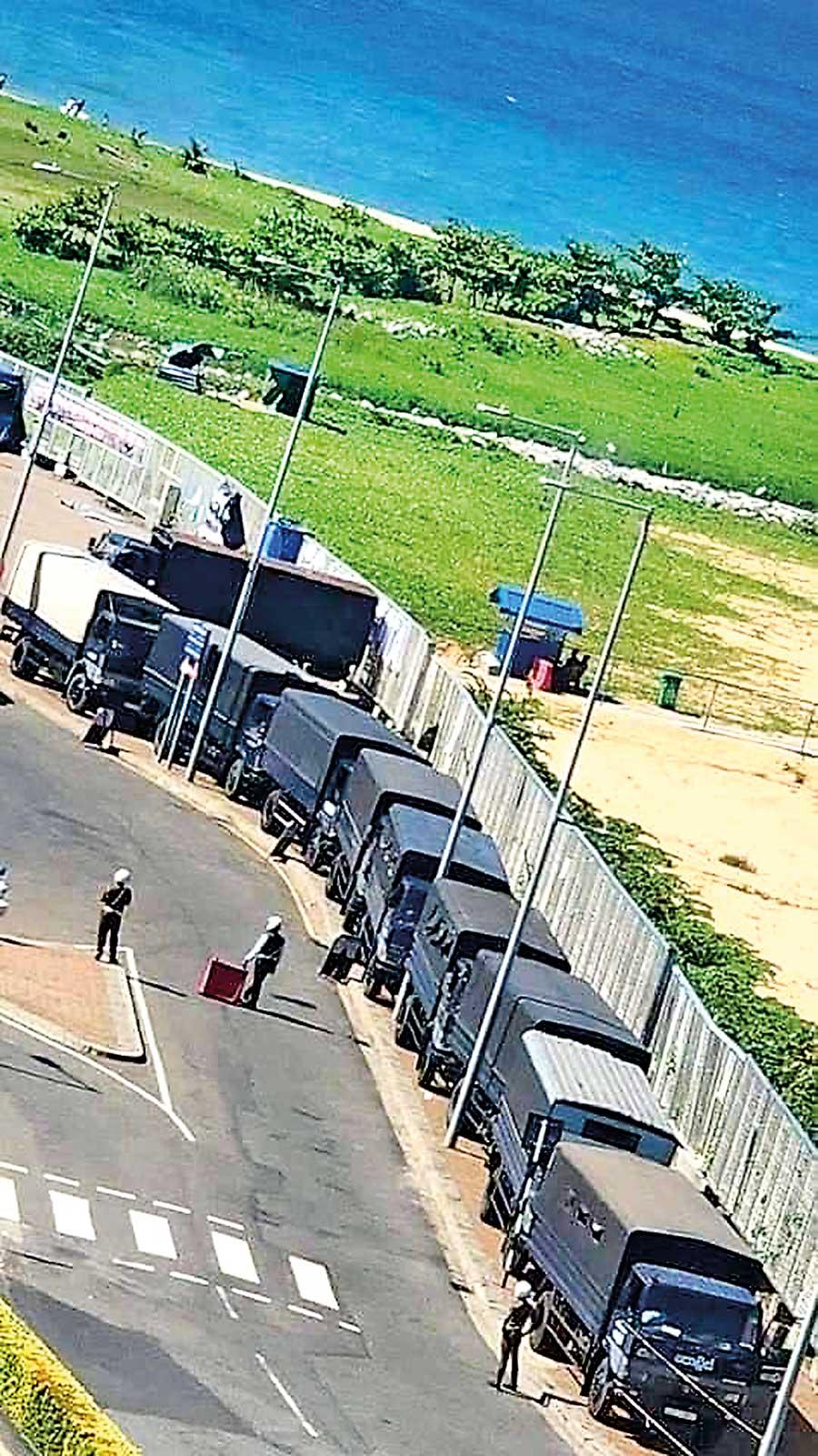20 Apr 2022 - {{hitsCtrl.values.hits}}

Protester holding a placard inviting people to protest against the police dismantling the GotaGoGama hut in Galle
The spate of public protests in Sri Lanka continues unabated as the government had failed to deliver what it promised to the citizenry. Just before the Sri Lankan delegation commenced talks with the International Monetary Fund, the Indian Oil Company and Ceylon Petroleum Corporation announced fuel price hikes, causing several private buses to halt their trips. With that bus owners announced a hike in bus fares and by yesterday morning, the price of lunch packets were raised by 20%, school van fares were raised by Rs. 1000 while the cost of wheat flour was increased by Rs. 20, further inconveniencing the public. To top it all off a new cabinet of ministers and state ministers were sworn in, which was yet another shuffling of heads. In a previous address to the nation, Prime Minister Mahinda Rajapaksa said Sri Lanka would lose vital dollars as a result of ongoing protests. On the contrary, while addressing the new cabinet of Ministers, President Rajapaksa not only responded to ongoing protests in a positive manner but also said that most protesters are patriotic and are expressing their love towards the country. In an appalling turn of events, the Rambukkana police opened fire at a group of protesters who obstructed the railway line. Following the incident, one individual succumbed to injuries while twelve area residents including ten police officers were hospitalized. At the time this paper went into print.
it promised to the citizenry. Just before the Sri Lankan delegation commenced talks with the International Monetary Fund, the Indian Oil Company and Ceylon Petroleum Corporation announced fuel price hikes, causing several private buses to halt their trips. With that bus owners announced a hike in bus fares and by yesterday morning, the price of lunch packets were raised by 20%, school van fares were raised by Rs. 1000 while the cost of wheat flour was increased by Rs. 20, further inconveniencing the public. To top it all off a new cabinet of ministers and state ministers were sworn in, which was yet another shuffling of heads. In a previous address to the nation, Prime Minister Mahinda Rajapaksa said Sri Lanka would lose vital dollars as a result of ongoing protests. On the contrary, while addressing the new cabinet of Ministers, President Rajapaksa not only responded to ongoing protests in a positive manner but also said that most protesters are patriotic and are expressing their love towards the country. In an appalling turn of events, the Rambukkana police opened fire at a group of protesters who obstructed the railway line. Following the incident, one individual succumbed to injuries while twelve area residents including ten police officers were hospitalized. At the time this paper went into print.
Should Sri Lanka be demonstrating its moral bankruptcy?
On April 18, the Colombo Fort Police filed a facts report pertaining to the Galle Face protest stating that the ongoing protests have caused severe traffic congestion causing disturbance to pedestrians and that the use of unauthorised loudspeakers have caused noise pollution in the area. Distinguished jurist and former secretary of the Ministry of Justice Dr. Nihal Jayawickrama in an interview with the Daily Mirror said that if the police or the military were to intervene to eject the people who are exercising their constitutionally guaranteed rights, Sri Lanka would stand condemned as never before.
What is now taking place at Galle Face, at GOTAGOGAMA, is being viewed throughout the world. If the police or the military were to intervene to eject the people who are exercising their constitutionally guaranteed rights, Sri Lanka would stand condemned as never before. Does a country that has already declared to the world that it is financially bankrupt, also wish to demonstrate that it is also morally bankrupt?
- Dr. Nihal Jayawickrama Former Secretary- Ministry of Justice
These rights will, in many cases, be the only mechanisms available to them to express their legitimate concerns. Indeed, they are one of the principal means by which ordinary people can meaningfully contribute to the constitutional objective of advancing human rights and freedoms
- Dr. Nihal Jayawickrama - Former Secretary - Ministry of Justice
The Excerpts:
Q From a Constitutional point of view, could you give a background on people’s right to protest?
The right to protest is derived from the freedom of expression, which is one of several mutually supporting rights including the freedom of assembly and the freedom of association, all of which are guaranteed by our Constitution. Implicit in the right to freedom of expression is a corresponding right to associate with others in pursuit of a wide variety of political, social, economic, educational, religious, and cultural pursuits. The right to these freedoms is also recognized in the International Covenant on Civil and Political Rights which the Government of Sri Lanka has ratified, and for the observance of which the Government is responsible to the Human Rights Committee established under that Covenant as well as to the other States Parties of that multilateral treaty.
The right to freedom of expression protects not only the substance of the ideas expressed, but also the form in which they are conveyed. The use of colourful, forceful, and even disrespectful language may be necessary to capture the attention, interest, and concerns of the public regarding the need to rectify the situation protested against. Criticism is protected even if extreme, unjust, unbalanced, exaggerated, and prejudiced so long as it expresses an honestly held opinion on a matter of public interest on facts that are true. The right to express even severe criticism of measures taken by public authorities without fearing state sanctions is fundamental to the freedom of expression. The expression of humour is not only permissible but also necessary for the health of democracy. Humour, through cartoons and caricatures, is one of the most typical means of expression. It is one of the great solvents of democracy. Raising a banner is a form of expression. Placards posted in public streets are an important means of expression.
The right to demonstrate and hold processions is an attribute of the freedom of assembly. It is also an inseparable component of the right to freedom of speech. It constitutes one of the main ways of expressing opinion and raising issues on the public agenda. It is the visible manifestation of the feelings and sentiments of an individual or a group. It is therefore a communication of one’s ideas to others to whom it is intended to be conveyed. This right includes the right to use streets and parks which are dedicated to the use of the public, subject to reasonable limitations to ensure their continued use to which they are dedicated.
The freedom of assembly enables both private meetings and meetings in public thoroughfares. It enables not only static meetings, but also public processions which are assemblies in motion.
Q On what grounds can someone go to courts to disrupt a series of mass protests?
The Constitution states that the exercise of the rights to freedom of expression and assembly may be restricted by law in the interests of national security, public order and the promotion of public health or morality, or for the purpose of securing the recognition and respect for the rights and freedoms of others. This means that laws may be enacted to secure these interests. If such laws exist, they can be invoked in a court. However, any such restrictions must not put in jeopardy the right itself. The international instruments lay down conditions, and it is only subject to those conditions that restrictions may be imposed. The restrictions must be imposed by law, and they must be justified as being necessary to secure one or more of these purposes. The exceptions must be narrowly interpreted, and the necessity for any restriction must be convincingly established. There must be a pressing social need, be proportionate to the legitimate aim pursued, and the reasons given to justify it must be relevant and sufficient. According to the Supreme Court of India, “the restriction must be justified on the anvil of necessity and not the quicksand of convenience or expediency”. The necessity must be convincingly established. There must be a pressing social need.
Judiciaries in many countries have emphasized that if the police entertain a “reasonable belief” that disturbances might occur during an assembly, the police should provide security and supervision in anticipation of disturbances. It is the paramount duty of the police to maintain law and order but not to curtail people’s freedoms and liberties on mere anticipatory grounds which could turn out to be false. Lawful assemblies should not be dispersed under any circumstances.
Q If the protest at Galle Face for example is stopped by force, what sort of damage would it carry to the international community?
Let me give an example. In 1989, while living and working in Hong Kong, I watched the students protest against the Chinese Government at Tiananmen Square. It was quite similar to what is now taking place at Galle Face (or GOTAGOGAMA). There was an air of freedom around. There were speeches and songs. The sit-in was televised around the world (as today’s events in Sri Lanka are being). Hosts of journalists who had been to Beijing to cover the visit of President Gorbachev had stayed behind to cover this wonderful phenomenon. The people of Hong Kong sent hundreds of tents. Then, on the night of June 4th, the military entered in tanks, with guns blazing. The students began to flee, but many were shot and killed. The tanks rolled over the tents where those who were tired or sick or injured remained and crushed them to death.
Two months later, with a small group of university colleagues, I took a student leader who had managed to escape to France to the UN Human Rights Sub-Committee meeting in Geneva. There, for the first time in its history, the UN focussed its searchlight on China. For the first time, a resolution was adopted censuring a permanent member of the Security Council. What is now taking place at Galle Face, at GOTAGOGAMA, is being viewed throughout the world. If the police or the military were to intervene to eject the people who are exercising their constitutionally guaranteed rights, Sri Lanka would stand condemned as never before. Does a country that has already declared to the world that it is financially bankrupt, also wish to demonstrate that it is also morally bankrupt?
“However these protests don’t seem to have a proper vision. What is the objective of these protests? Therefore some semblance of rule of law should give some direction to the struggle. In fact it’s a wonderful opportunity to make a better system”
- Chrishmal Warnasuriya Attorney-at-Law
Q How important is it to allow the freedom of expression and dissent?
The right to the freedoms of expression and assembly are central to constitutional democracy. They exist primarily to give a voice to the powerless. This includes groups who do not have political or economic power as well as other vulnerable persons. They provide an outlet for their frustrations. These rights will, in many cases, be the only mechanisms available to them to express their legitimate concerns. Indeed, they are one of the principal means by which ordinary people can meaningfully contribute to the constitutional objective of advancing human rights and freedom.
Power of the People
“The Constitution is the supreme law and it overrides all other laws,” opined attorney-at-law Chrishmal Warnasuriya. “We, as protesters cannot violate the law by destroying public property etc.”
He said that there’s no organ of state that’s above the law. “The fundamental principle has been the rule of law. In UK, the Parliament is supreme and in the US the Executive is supreme. But here it’s the power of the people. People have given power to the Judiciary, Executive and Legislature. The Mahavansha speaks about the concept of public trust. If you look at the sermon delivered by Arahath Mahinda to Tissa, he says that you’re only a guardian; a guardian whose powers have been given by the people. Therefore if the government breeches public trust, citizens can take them to courts.”
When asked if ongoing protests would have a negative impact on discussions with foreign bodies to obtain loans for example, Warnasuriya replied in the negative. “However these protests don’t seem to have a proper vision. What is the objective of these protests? Therefore some semblance of rule of law should give some direction to the struggle. In fact it’s a wonderful opportunity to make a better system.”
BASL urges govt. not to disrupt freedom of dissent
Issuing a statement on Saturday, the Bar Association of Sri Lanka requested the government to desist from taking any steps whatsoever to disrupt what is a legitimate exercise of the freedom of dissent of the people. The statement said that any such attempt to disrupt a peaceful protest would have grave repercussions on the country, its democracy, economy and rule of law.
There is a Universal Declaration Report drafted every four years and these incidents will be included in this report. The use of artificial power will also affect talks with the International Monetary Fund. But when exercising freedom of speech we have to be careful about using defamatory statements which are often used in defence. We need to discipline ourselves
- Dr. Prathiba Mahanamahewa, former HRC Commissioner of Sri Lanka
Is the government hiding the truth?
The use of force to stop ongoing people’s protests is an artificial power. “We need to be mindful about several areas at this point,” reminded Dr. Prathiba Mahanamahewa, former Commissioner of the Human Rights Commission of Sri Lanka. “These incidents will be highlighted in the United Nations Human Rights Council sessions in July. There is a Universal Declaration Report drafted every four years and these incidents will be included in this report. The use of artificial power will also affect talks with the International Monetary Fund. But when exercising freedom of speech we have to be careful about using defamatory statements which are often used in defence. We need to discipline ourselves. Anybody can criticise the President but if they use filthy language they will experience repercussions during the later stages, especially with the involvement of children in these protests.”
He further recalled the Indian economic crisis back in 1991. “The Indian government only had US$ 1.2 billion to pay foreign debts. However they appointed Dr. Manmohan Singh as the finance minister and the matter was resolved in due course. Today Sri Lanka is facing a similar situation. Those in the government have a right to tell the truth as it comes under people’s right to information. People have the right to know what is going on behind the scenes.”

Police trucks docked at Galle Face on Saturday and were later removed following statements issued by BASL
25 Nov 2024 8 hours ago
25 Nov 2024 9 hours ago
25 Nov 2024 9 hours ago
25 Nov 2024 25 Nov 2024
25 Nov 2024 25 Nov 2024